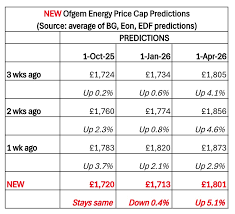
Introduction to Ofgem
The Office of Gas and Electricity Markets, commonly known as Ofgem, is the regulator for the electricity and gas markets in Great Britain. Established in 2000, Ofgem’s primary responsibility is to protect the interests of consumers while ensuring a stable and competitive market. This regulatory body plays a critical role in overseeing the energy sector, particularly in light of the ongoing energy crisis, which has heightened the focus on energy affordability and sustainability.
The Current Energy Landscape
As the UK grapples with soaring energy costs due to a volatile global market and the impact of the COVID-19 pandemic, Ofgem has been under immense pressure to act. According to recent reports, energy prices for consumers have skyrocketed, with average household bills expected to exceed £3,500 by the winter of 2023. In response, Ofgem has implemented several measures aimed at regulating prices and protecting vulnerable consumers, including the Energy Price Cap.
Energy Price Cap and Recent Developments
The Energy Price Cap, first introduced in January 2019, sets a limit on the maximum amount suppliers can charge customers for standard variable energy tariffs. Ofgem reviews this cap regularly, and a scheduled update in October 2023 is anticipated, which will potentially reflect further increases in the cost of wholesale energy. Ofgem’s recent actions to increase transparency within the energy market include publishing guidelines for suppliers on pricing strategies and service standards.
Future Outlook and Impact on Consumers
Looking ahead, Ofgem continues to face challenges, with the looming threat of further price hikes for consumers as global energy demand fluctuates and regulations evolve. Analysts suggest that sustained high prices could result in increased government intervention and support schemes for low-income families, especially as winter approaches. Ofgem is also advocating for long-term solutions, including investment in renewable energy sources and improved energy efficiency, to create a more resilient energy system for the future.
Conclusion
Ofgem remains at the forefront of the UK’s energy regulatory framework, tasked with balancing the needs of consumers, market efficiency, and environmental sustainability. As the energy crisis unfolds, its role will undoubtedly become even more pivotal, impacting not only the costs of energy bills but also the future structure of the energy market. Consumers must stay informed and engaged, especially during this period of transition, to understand how regulatory changes may affect their households.
You may also like

The Importance of the National Grid in the UK

Aubergine Katsu Bao Buns Recall: What You Need to Know
